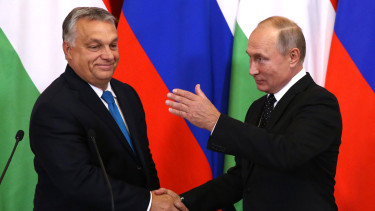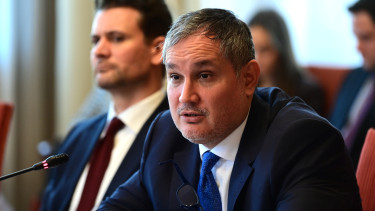Hungary's László Trócsányi gets portfolio in new European Commission
Three Executive Vice Presidents
Frans Timmermans (Netherlands), Margrethe Vestager (Denmark) and Valdis Dombrovskis (Latvia) are going to be the three Executive Vice Presidents of the European Commission to be officially set up in November, the EC announced on Tuesday..
Hungary has got enlargement
Lászlónak Trócsányi, Hungary's former Minister of Justice of Hungary, will lead the ‘Neighbourhood and Enlargement' portfolio in the European Commission. He is taking over from Johannes Hahn (Austria)
The Hungarian government wanted this position for the former Justice Minister, according to local press reports, whereas it seemed that Trócsányi will be Commissioner for Humanitarian Aid and Civil Protection. In this sense, the outcome is positive for Hungary, although it remains a quesstion whether Trócsányi will get the green light after his hearing from the relevant committee of the European Parliament or not. If he is approved, a plenary meeting of the EP is expected to vote in one sitting on the entire EC team of commissioners in October, and if it is endorsed as such, the new Commission can start its operation on 1 November. If, however, Brexit is put off , and the Brits need to nominate a commissioner in the second half of October, the EP's plenary meeting will need to vote on the entire Commission again. In that case, the whole process of setting up the new EC could suffer a delay.
The predecessor of Trócsányi was Tibor Navracsics, as Commissioner for Education, Culture, Youth and Sport in the previous cycle..
Last week, Hungary's Minister of Foreign Affairs and Trade Péter Szijjártó said Hungary was in favour of EU enlargement, and that the continent can be strong only if it has more member states..
The Government Information Centre reacted to the EC's announcement by releasing a brief statement, in which it said
"neighbourhood policy and EU enlargement is one of the most important portfolios" and it is an opportunity for the EU to grow stronger with new member states. "An important objective is the stabilisation of the Balkan countries, which would also be in the interest of stopping migration."
This is how the new European Commission would look like
The European Commission has recently adopted the Political Guidelines, a strategic document for the next five years (2019-2024). Commission President-elect Ursula von der Leyen promised that the new Commission will reflect the priorities and ambitions set out in the Political Guidelines.
At the heart of our work is the need to address the changes in climate, technology and demography that are transforming our societies and way of life. Existing powers are going down new paths alone. New powers are emerging and consolidating. This has left a feeling of unease and anxiety in many communities across Europe. The EU must lead the transition to a healthy planet and a new digital world. But it can only do so by bringing people together and upgrading our unique social market economy to fit today's new ambitions
, the EC said in the statement.
"As we embark on this journey, we must make the most of all of our strengths, talent and potential. We must focus on equality and creating chances for all, whether for women or men, whether from East, West, South or North, whether young or old. We must defend our common values and uphold the rule of law. In the next five years all of the European institutions have to work together closely to allay fears and create opportunities," it added.
8 Vice-Presidents, 3 Executive Vice-Presidents
The new College will have eight Vice-Presidents, including the High-Representative of the Union for Foreign Policy and Security Policy (Josep Borrell). The Vice-Presidents are responsible for the top priorities in the Political Guidelines. They will steer our work on the most important overarching issues, such as the European Green Deal, a Europe fit for the digital age, an economy that works for people, protecting our European way of life, a stronger Europe in the world and a new push for European democracy. The Commissioners are at the centre of the structure of the new College. They will manage the expertise provided by the Directorates-General.
Three Executive Vice-Presidentswill have a double function. They will be both Vice-President responsible for one of three core topics of the President-elect's agenda and Commissioners.
Executive Vice-President Frans Timmermans (Netherlands) will coordinate the work on the European Green Deal. He will also manage climate action policy, supported by the Directorate-General for Climate Action.
President-elect Ursula von der Leyen said: "I want the European Green Deal to become Europe's hallmark. At the heart of it is our commitment to becoming the world's first climate-neutral continent. It is also a long-term economic imperative: those who act first and fastest will be the ones who grasp the opportunities from the ecological transition. I want Europe to be the front-runner. I want Europe to be the exporter of knowledge, technologies and best practice."
Executive Vice-President Margrethe Vestager (Denmark) will coordinate our whole agenda on a Europe fit for the digital age and be the Commissioner for Competition, supported by the Directorate-General for Competition.
President-elect Ursula von der Leyen said: "Digitalisation has a huge impact on the way we live, work and communicate. In some fields, Europe has to catch up — like for business to consumers — while in others we are frontrunners — such as in business to business. We have to make our single market fit for the digital age, we need to make the most of artificial intelligence and big data, we have to improve on cybersecurity and we have to work hard for our technological sovereignty."
Executive Vice-President Valdis Dombrovskis (Latvia) will coordinate the work on an Economy that Works for People and be the Commissioner for financial services, supported by the Directorate-General for Financial Stability, Financial Services and Capital Markets Union.
President-elect Ursula von der Leyen said: "We have a unique social market economy. It is the source of our prosperity and social fairness. This is all the more important when we face a twin transition: climate and digital. Valdis Dombrovskis will lead our work to bring together the social and the market in our economy."
The 5 other Vice-Presidents are:
- Josep Borrell (Spain, current Spanish Foreign Minister): HR/VP-designate, A Stronger Europe in the World;
- Věra Jourová (Czech Republic, Commissioner in the Juncker Commission): Values and Transparency;
- Margaritis Schinas (Greece, former Member of the European Parliament, long-serving official of the European Commission): Protecting our European Way of Life;
- Maroš Šefčovič (Slovakia, Vice-President in the Juncker Commission): Interinstitutional Relations and Foresight;
- Dubravka Šuica (Croatia, Member of the European Parliament): Democracy and Demography.
The other Commissioners-designate are as follows:
- Johannes Hahn (Austria) will be in charge of ‘Budget and Administration', and will report directly to Commission President Ursula von der Leyen. As a long-serving member of the College, he knows about the importance of nurturing a modern administration.
- Didier Reynders (Belgium), who trained as a lawyer, is a highly experienced former national Finance Minister, Minister for Foreign and European Affairs and Minister of Defence. In the new Commission, he will be responsible for ‘Justice' (including the topic of the rule of law).
- Mariya Gabriel (Bulgaria) is a current European Commissioner. She worked with dedication and energy on the digital portfolio, and is now moving on to create new perspectives for the young generation (‘Innovation and Youth' portfolio).
- Stella Kyriakides (Cyprus) is a medical psychologist with many years of experience in the field of social affairs, health and cancer prevention. She will lead the ‘Health' portfolio.
- Kadri Simson (Estonia) is a long-serving member of the Estonian parliament and Minister for Economic Affairs and Infrastructure. She will be in charge of the ‘Energy' portfolio.
- Jutta Urpilainen (Finland) was not only Finance Minister and a long-standing member of the Finnish Parliament's Foreign Affairs Committee; she has also worked as a special envoy in Ethiopia. She will take over responsibility for ‘International Partnerships'.
- Sylvie Goulard (France), former Member of European Parliament, is a dedicated and convinced European. As the ‘Internal Market' Commissioner, she will lead our work on industrial policy and promote the Digital Single Market. She will also be responsible for the new Directorate-General for Defence Industry and Space.
- László Trócsányi (Hungary) is the former Minister of Justice of Hungary. He will lead the ‘Neighbourhood and Enlargement' portfolio.
- Phil Hogan (Ireland), the incumbent Commissioner for Agriculture, will bring his experience to the new Commission in the ‘Trade' portfolio.
- Paolo Gentiloni (Italy), former Italian Prime Minister and Minister of Foreign Affairs, will be sharing his vast experience in the ‘Economy' portfolio.
- Virginijus Sinkevičius (Lithuania), Lithuanian Minister for Economy and Innovation, will be responsible for ‘Environment and Oceans'.
- Nicolas Schmit (Luxembourg) is bringing his experience from the European Parliament and his service as national Minister for Employment and Labour, and will now be responsible for the ‘Jobs' portfolio.
- Helena Dalli (Malta) has dedicated her political life to equality, serving as Minister for Social Dialogue, Consumer Affairs and Civil Liberties, and also as a Minister for European Affairs and Equality. She will lead the ‘Equality' portfolio.
- Janusz Wojciechowski (Poland) was a long-serving Member of the European Parliament in the Agriculture Committee, and is currently a Member of the European Court of Auditors. He will be in charge of the portfolio ‘Agriculture'.
- Elisa Ferreira (Portugal) is currently Vice-Governor of Banco de Portugal. She has been a Member of the European Parliament for many years, and was the Portuguese Minister for Planning and Minister for Environment. She will lead the ‘Cohesion and Reforms' portfolio.
- Rovana Plumb (Romania) is a Member of the European Parliament (Vice-President of the Social and Democrats Group), and is a former national Minister of Environment and Climate Change, Minister of Labour, Minister of European Funds, Minister of Education and Minister of Transport. She will be in charge of the ‘Transport' portfolio.
- Janez Lenarčič (Slovenia) is a Slovenian diplomat. He was Secretary of State for European Affairs, and worked closely for several years with the United Nations, the Organisation for Security and Cooperation in Europe and the European Union. He will be in charge of the ‘Crisis Management' portfolio.
- Ylva Johansson (Sweden) is national Minister for Employment but also a former Minister for Schools and Minister for Health and Elderly Care and member of Swedish Parliament. She is also a highly respected expert in the fields of employment, integration, health and welfare. She will lead the ‘Home Affairs' portfolio.
Tasks and strategies
According to the statement, President-elect von der Leyen wants to preside over a College that is committed, that understands Europe and that listens to what Europeans want.
This is why all members of the College will visit every Member State in the first half of their mandate. They should not only get to know the capitals, but also visit the regions in which the people of Europe live and work.
Just as Europe must become fit for the digital age, so must the Commission. College meetings will be paperless and digital.
The goal of the new Commission is to make life easier for people and businesses. When the Commission creates new laws and regulations, it will apply the ‘One-in, one-out' principle to cut red tape.
Next steps
As a next step, the European Parliament has to give its consent to the entire College of Commissioners, including the High Representative of the Union for Foreign Affairs and Security Policy/Vice-President of the European Commission.
This is preceded by hearings of the Commissioners-designate in the relevant Parliamentary committees, in line with Parliament's Rules of Procedure.
Once the European Parliament has given its consent, the European Council formally appoints the European Commission, in line with Article 17(7) TEU.
Cover photo by MTI/Szilárd Koszticsák











